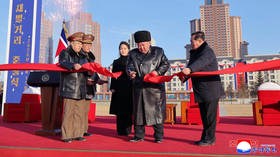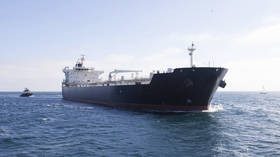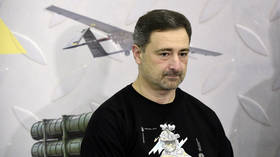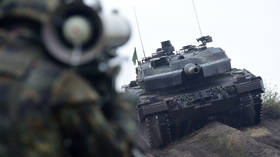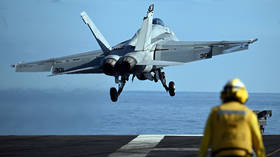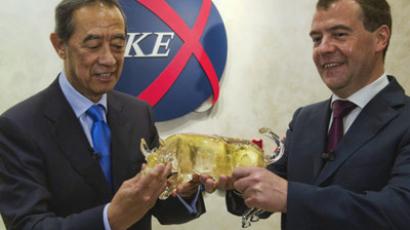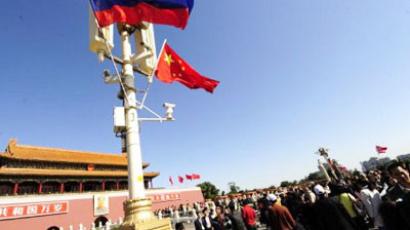Russia and China: from cooperation to synergy
Russian Prime Minister Vladimir Putin, in an interview with Chinese state broadcaster CCTV, said that China and Russia should now extend their cooperation effort into high-tech industries. Read the full text of Putin’s interview with CCTV.
CCTV: Good evening, Mr. Prime Minister. I am deputy editor-in-chief of the Xinhua news agency. This is a renowned Chinese anchor.Vladimir Putin: Nice to meet you. Good evening.CCTV: Two years ago, on October 13, we interviewed you at the Russian Embassy to China. We still remember every detail of that interview.VP: It is very nice of you.CCTV: Before proceeding with my questions, I would like to wish you a happy birthday on behalf of all Chinese media workers, although we are a few days late.VP: Thank you very much.CCTV: Let us begin. This year will see the 10th anniversary of the Russian-Chinese treaty on friendship and cooperation. What is your view of the current level of Russian-Chinese relations? What areas do you think would benefit from an additional boost?VP: The treaty is a framework document that provided a new foundation for our relations. With that treaty, we have brought Russian-Chinese relations to a very high level. I would even say it is the highest peak in the history of our relations. First and foremost, we have achieved an unprecedented level of trust in international affairs. We cooperate very closely on the international arena. Of course, both Russia and China are large countries. They are both major players on the international arena. Russian-Chinese cooperation on the international arena has become a major influence on global politics. We have learned to coordinate our efforts in order to protect our legitimate interests. This treaty made it possible for us to work together in some sensitive areas, such as military-technical cooperation. We are talking about multi-billion dollar contracts and the prospect of bringing our cooperation to a new level. We are introducing joint R&D projects and joint manufacturing of certain types of machines. Today, we have made another step in this direction as we agreed to create a network of workshops in China that would maintain and repair Russian-manufactured machines. We have reached an unprecedented level of economic cooperation. Even in the best pre-crisis year, 2008, Russian-Chinese trade was estimated at $55.9 billion. But now, after the crisis, we have not only recovered that level; we even surpassed it. This year, we expect our trade to hit at least $70 billion, perhaps more, closer to $80 billion. It is quite possible that our trade will grow to $100 billion by 2015 and to $200 billion by 2020.Look at what is happening in the humanitarian sphere. We had a year of Russian culture in China and a year of Chinese culture in Russia; a year of Russian language in China and a year of Chinese language in Russia. It was very much encouraged when I saw how the year of the Russian language in China was organized. We were even a bit surprised by how many people took part in it and how enthusiastic they were.I think it was only natural for Russia to help the people of China deal with the consequences of the severe earthquake. As you know, we invited Chinese children from the areas struck by the earthquake to visit Russia. Chairman Hu Jintao supported this initiative and later invited a group of Russian children to China. All of that indicates that our relations have reached an unprecedented level, and all the progress we have made was, of course, based on the treaty you mentioned.CCTV: I remember that, during the rescue operation in Sichuan, the last living person saved from the rubble was rescued by Russian rescue workers. That was in Dujiangyan.VP: Yes, it is quite possible, because Russia has a well-equipped rescue service with advanced technical capabilities that is ready to be deployed anywhere. But that is not the only area of our cooperation. I know for a fact that whenever Russia is confronted with a serious problem, our Chinese friends respond immediately, offering assistance, sympathy or support. This, too, helps to create a good atmosphere in relations between our countries.CCTV: Your visit is in the spotlight of many media – both in China and Russia, and in other countries. Perhaps, this is because it’s your first major trip after you announced that you would run for the president of the Russian Federation next year. During your visit, Russia and China have reached mutual understanding in many areas and signed contracts worth billions of US dollars. Does this visit have any special significance for you?And another question: have you been able to make progress in the key areas of cooperation, say, in natural gas exports? VP: I do not consider gas exports to be a key area of our cooperation. Our partnership covers a lot of areas, and it’s becoming even more diversified. I believe the priorities for collaboration must lie in the high-tech industries – not only the traditional ones like machine-building but also in aircraft manufacturing. This is an area where our national interests definitely converge. If we want to get a solid share of the global market, we need to join our efforts, for example, in designing and manufacturing wide-body passenger planes. We need to pool our technological and financial resources.There are also other areas, like nano- and biotechnologies, information technologies and medicine. But even in energy, both countries have prepared numerous proposals for cooperation. We do work with hydrocarbons, with oil and natural gas, but our plans are not limited to gas exports to China. We are now discussing joint projects to develop oil and gas fields, for example, in the Russian region of Udmurtia. We may work together on the Sakhalin-3 project in Russian Far East, on the island of Sakhalin, or on the Magadan-1 project on shelf sites. And of course, we’ve talked about supplying natural gas to China. There are two routes available, the eastern and western one. Our Chinese friends have chosen the western route for the first stage. It runs through Russia’s Altay Region. But we are also considering the eastern route – starting from around the city of Vladivostok. Russia has recently completed a pipeline from Sakhalin to Vladivostok via Khabarovsk. Once we’ve reached sufficient volumes, this option may become feasible too, including the possibility of building LNG plants.Pricing policies have come to the fore here, of course. In a meeting with my counterpart, the head of the State Council, I said that a buyer always wants to buy cheap whereas a seller always wants to sell high. We are not directly involved with trade at the political level – it’s up to our companies to find a fair solution that would be good both for China and Russia, which I think they will do.I don’t want to go into details. Commercial negotiations are a very complicated matter. Just like in medicine, the first rule is you don’t do harm. We are aware of China’s demands, and China knows what our resources are. They are huge. We are capable of meeting the needs of our Chinese friends as regards this type of fuel. It will provide a solution not only to economic and energy challenges, but also to environmental ones because natural gas is the greenest fuel option among hydrocarbons.Also, we have resumed power supplies to China, and are now constructing a high-voltage transmission line. If I am not mistaken, the stretch over the Amur River has been completed. Russia may build additional power-generating plants on its territory. Another area of cooperation are coal exports. Some of our companies already work with their Chinese colleagues, and they have some interesting projects for expanding cooperation with the direct participation of Chinese companies.Finally, we cooperate in nuclear energy. We all know about the tragedy that happened in Japan. But we also realize that countries like China and Russia cannot do without nuclear energy. Therefore, we should not panic and close down all the nuclear plants. Rather, we should introduce the newest technology that would rule out the very possibility of such a disastrous scenario.We have completed the first stage of the Tianwan Nuclear Power Plant project. It was built according to the highest world standards both in terms of efficiency and safety, using the most advanced technology. We have completed the construction of the experimental fast-neutron reactor, which was actually completed nine months ahead of schedule. I would like to emphasize that this is state-of-the-art equipment, a cutting-edge technology. There are only four reactors of the kind in the world: two in Russia, one in Japan, and now there will be one in China. To sum it up, our economic cooperation is quite diverse and multifaceted. Of course, our cooperation in natural gas may also reach big proportions, and, to repeat, we will do our best to find a compromise that would be acceptable for both sides.CCTV: For such large countries that have reached an unprecedented level of political trust, $100 billion dollars by 2015 is actually not that much.VP: That’s true. We can do a lot to reach this benchmark earlier and achieve a greater figure by that time. That’s quite feasible. I have not yet mentioned such spheres of cooperation as space, shipbuilding and many others. The project of designing a new wide-body aircraft alone will greatly boost the high-tech sector both in Russia and China. So far, China has been purchasing aircraft from the United States and Europe, and Russia has been recently leaning the same way. Of course, we are very happy for our partners, but countries like Russia and China can, and should, have their own aircraft-manufacturing industry. Besides, this is not something new for Russia. We just need to further cultivate the technologies, the personnel and the level of research that Russia had in the past. Both Russia and China have markets for aircraft, and this is a huge advantage. In fact, we have many areas where we can have this kind of cooperation, and if we focus on them, we will definitely achieve better results than the ones I mentioned earlier.CCTV: You have arrived on an Ilyushin IL-96. It must be a very good aircraft.It is a good aircraft. It has good engines, which are also Russian-made. In the modern-day world, nothing remains unchanged. The United States produces practically all types of aircraft. Well, not exactly every type though: there is an amphibious jet plane, Be-200, and it is only produced in Russia and nowhere else in the world. But in all the major aircraft categories, the United States can definitely secure its leadership in production, which European countries can no longer do: they have had to pool their resources and set up a pan-European aerospace company, which includes Germany, France, Spain and other countries. I repeat, we need to pool your assets, including human resources, research, technology, finance and available markets.CCTV: Some political analysts and commentators believe that Russia and China, being two rapidly developing emerging markets, can largely influence, and possibly even spearhead, the establishment of a new world order. Cooperation within BRICS is also rapidly developing. How do you view cooperation between Russia and China in terms of reforming the global economic system? VP: I am not sure whether your question got properly translated: at first, you mentioned establishing a new world order, and now you are asking about reforming the existing system. In case that interpretation was correct, I have to say that creating a new order is not the same thing as reforming the existing one. I think that we should consider reforming the current global architecture, especially global financial institutions, such as the International Monetary Fund and the World Bank. I definitely agree that the BRICS countries should play a greater role in these international institutions, considering our nations’ growing economic clout. It is certainly necessary to straighten out those hedge funds and other sophisticated financial instruments, decrease the volatility of mineral commodity markets, and generally pay more attention to production industries and limit speculation. In this respect, the BRICS countries, including Russia and China, can, and should, play a positive role in stabilizing the global economy.CCTV: We have mentioned the global economy. As we all know, right now Europe is increasingly ravaged by a sovereign debt crisis, coupled with a banking crisis. Has it had any impact on Russia? And as a follow-up on that, I remember you have voiced some stark criticism of the United States, saying it was feeding off the global economy like a parasite. What do you think should be done to bring about a change?VP: I would like to note from the start that luckily, there is no banking crisis in Europe so far. They have financial difficulties, that is true, but that has not inflicted any fatal damages on their financial system or any important financial institutions. Moreover, the leaders of France and Germany, Europe’s leading economies, have announced that they do consider bailing out certain financial institutions in view of the debt crises in some of the euro zone member-states. This is a very good sign. Of course, the debt problems are there and they were caused by the lack of financial discipline. At the moment, however, the debt crises are more of a political problem than an economic one. What is the essence of that political problem and why do I say it is not economic? Greece is currently the most problematic country in the euro zone but, unless I am mistaken, Greece only accounts for 2% of Europe’s combined GDP. It is possible to bail Greece out, it would cost 1 to 1.5 trillion euros according to different estimates. The figure is quite substantial but it is nothing the euro zone cannot handle. It is not that much money by European standards: a substantial sum, but still payable. Now, why is it a political problem? Because, in order to provide the necessary funds, Europe’s larger economies will need to help out the countries that are facing difficulties. That will require some political courage on the part of their leaders because those measures would obviously be unpopular with the people.In the long run, however, the united Europe will benefit from such a move. Thus, something needs to be done. Why are we discussing this issue? Because, unfortunately, everything that is happening in Europe has a negative effect on the global economy. Incidentally, I don’t think the BRICS countries may play a significant role in the bailout. Europe’s heavyweights have enough resources to solve the problem.As regards my remarks about the US economy, I don’t think I said something special. Listen to European experts, heads of states, government members, finance and economics ministers of leading European nations. They are saying the same thing. My remarks were nothing new. Obviously, if a country’s debts and expenses are growing it means that the country is enjoying benefits at the expense of its national debt. Let us take a look at what is happening there. The Federal Reserve is buying up treasury bonds. In other words, they are simply printing money. I don’t want to say whether it is good or bad. Maybe our colleagues in the US have a better understanding of how the economy works than we do in our countries, but I will say their actions go against the recommendations they used to give us in the past. I repeat, at this stage, some of these measures may be justified, but only to an extent. This is the way politics works.Besides, I never said the US was feeding off the global economy like a parasite. What I said is that it takes advantage of the monopoly situation where the US dollar is practically the only world currency. That’s another problem. I think this is bad both for the global economy and for the US itself, because it causes the country to let its guard down and not show enough financial discipline. But I don’t want this to sound like sweeping criticism, like I am trying to smear someone. I am not. Every country has its own problems. There is nothing to be happy about here. What we have to do is to stand together with our partners in Europe, with the US and with the BRICS countries, and think of a way out of this situation. The G-20 may be a good format for that. We need to look for collective, coordinated solutions.No one is interested in destabilizing the situation any further. In today’s global world, we are all pretty much in the same boat. Rocking that boat is a bad idea, because it might turn over.CCTV: Some commentators, mainly in the West, believe that the current economic situation will adversely affect Russia’s economic growth, saying that it will slow down next year. What do you think of such assessment? Russia is now actively pursuing a policy of modernization and innovation. What’s the ultimate objective of this policy?VP: We are keeping an eye on our domestic economy and the financial situation in the world. Our economy has been very vulnerable and dependent on world markets. The problem is that the bulk of the budget revenues come from exports, mainly exports of raw materials like oil, gas, chemicals and metals. And when a crisis breaks out in developed economies, which are the consumers of these resources, they cut down on consumption volumes, therefore decreasing our exports volumes. This is the pattern of dependence on raw materials. It’s one of the reasons why we have set as our priority goal the need to diversify our economy, to introduce more innovations, which would make it more effective long-term, to make sure it has the competitive edge and is immune to possible ups and downs of the world markets.It’s a long and slow road, slower than we want it to be, but we are moving ahead. There’s been some progress, for example, we have now been able to garner additional revenues to our national budget, and, mind you, more than two-thirds of these funds have come from the areas other than oil and gas, which means that we are witnessing a new trend emerging. As we move down this path, we will see an improvement of relations with China. Why? Because in absolute numbers, we will not cut down our production and sales of raw materials that China and our other partners so desperately need. Rather, we will change the structure of our industry and the structure of our budget revenues. Our long-term plans have mapped out the transformations along these lines till 2020. With the development of the high-tech industries, China will certainly be among our partners, and hopefully provide a good market to implement our achievements in the promising areas that I earlier mentioned, I mean nanotechnologies, biology, medicine, medical equipment, etc.Here’s another example. Russia remains the absolute world leader in the number of commercial rocket launches. As you understand, this is a perfect example of a high tech business. And if we manage to convert this experience into our joint space exploration projects, both Russia’s and China’s technological level will only increase. It’s not only about the production of rockets and commercial launches in the interests of third countries. It will spur the development of a whole chain of other businesses, like satellite scanning of the earth. The method has been employed by many companies for a variety of purposes, including the exploration of natural resources. Take space-based positioning systems. We’ve made significant progress in the development of the Glonass navigation system. At the moment, it is operated with the help of 26 satellites, providing almost global coverage. In this respect, we are slightly ahead of our European partners, although initially we launched our independent programs at the same time. Apart from the satellite fleet, we have to develop the ground infrastructure. It’s the area where we would greatly appreciate the help of our Chinese partners, with their technologies, advanced production facilities and qualified experts. It will boost the sales and beef up production, but also it will have an indirect positive impact on the economy in general – streamlining logistics for transportation by land, sea or air. There are multiple applications. I think our progress in this area will not do any harm, on the contrary, it will open up new horizons.CCTV: Russia has been trying to join the WTO for 17 years now. Do you hope to complete the process of accession by the end of the year?VP: It took China some 15 or 16 years of negotiations, too… CCTV: Yes, we have a similar situation.VP:Our aim is to join the World Trade Organization. This is a task we have set for ourselves. We believe the impact on the Russian economy will be mainly positive because it will increase the level of confidence in the economy and procedures existing within the economy, both administrative and legal. I would like to say that we have adjusted our national legislation to the WTO standards. Completely! We have settled the major issues with all of our major WTO partners. I think this matter is also quite politicized. If our partners in Europe and the US would like to see Russia joining the WTO and make the organization truly “universal,” as it claims to be… I don’t think we can say it was a universal structure without Russia in it: still, it has existed in that form for some time and will continue to exist without us. Nevertheless, Russia is the world’s top oil supplier and it would probably be better if Russia was in the WTO. A country that has potential in other areas of the economy to add to that (there are plenty of economic branches that influence global trade these days) should definitely be part of the WTO. Still, the decision is not ours alone to make, a lot of it depends on our partners.We have had quite a few debates on agricultural cooperation within the WTO: sanitary measures, quotas and so on. Then we had an equally long and tedious series of debates on regulations in the automotive industry. We have settled the majority of the problems. I am hoping we could finalize Russia’s accession this year. Russia, for its part, has done all it could to make that happen. Let me say again, however, that the issue is political and that the final decision is to be made by our main partners in the organization.We are very grateful to our friends in China for supporting Russia’s WTO application. Did you know, by the way, that not all of Russia’s economy branches are unanimously in favor of joining the WTO? Some think that Russian manufacturers are not yet able to compete with US, European and some Asian companies. These people are saying Russia would be better off outside of the WTO. Others encourage the government to push for accession as quickly as possible. I think that, overall, WTO accession would be a positive thing, but we have to become a member on standard conditions, with separate agreements in place that would help protect certain sectors of Russia’s economy until they are able to compete with foreign industries. Let me say again that we have already negotiated the main parameters of the accession agreement.CCTV: We wish Russia good luck.VP: Thank you.CCTV: I still have to personal questions for you. You are very well known in China as a multifaceted politician. You have a black belt in judo; you have flown a fighter jet and dived underwater… How do all these facets of your life come together and help you in your political career?VP: Frankly speaking, I do not think it is anything special. Hundreds, perhaps thousands of people do judo and other martial arts, including those of Chinese origin. Actually, I think that all martial arts were influenced by China in one way or another. Everyone has heard of wu-shu. A great number of people fly planes and even more dive. I just like discovering new things.CCTV: But you do not often see one man do all these things.VP: You know, I think there are a lot of such people. They are not spoken of so much and never shown on television at all. In any case, I have many acquaintances of the kind. And, of course, I like to try new things, to master new skills. That’s true. It is the process itself that excites me most. At the time I am trying to learn ice-skating. I had never put on a pair of skates in my life before. I told Prime Minister Wen Jiabao about it earlier today, we actually talked on a wide range of topics. But what I am doing is partly driven by my desire to win the right to host big-scale sports events for Russia. I am doing this primarily in order to attract the public attention to the importance of leading a healthy way of life, in order to boost interest in sports, in physical culture, to get people to take care of their health. Besides, trainings help me in whatever activity I am involved in – in politics, in business, in industry. No matter what job a man may do, health is always a great asset. It always helps.I remember my visit to Shaolin and the breathtaking performance of the monks who practice martial arts. I envied them, because I can’t do things they were doing.CCTV: You are known for your never ceasing interest in new and unexplored spheres and disciplines. They say you are a man who is always ready to face a challenge. You know what really hard work means, you even gave a detailed description of your experience, saying you worked like a galley slave. Have you decided to take up this work once again? Could you please reveal your understanding of the prospects of Russia’s development to us? What made you take such a decision?VP: First of all, I think that the decision we took together with Russia’s incumbent president Dmitry Medvedev is absolutely correct. It does not impair the system of state management in Russia, on the contrary, it makes it stronger.Secondly, we expect to get the voters’ support in the firm belief that we have gone through a very difficult period in the life of our country and economy, keeping the related losses to a minimum. I am talking of the world financial crisis.We have showed commendable performance in the pre-crisis period. Under my presidency the number of people living below the poverty line was cut by a half (I deem this to be the most important achievement) and the economy nearly doubled. I repeat: we have survived the economic crisis that hit Russia’s economy rather perceptibly with minimal losses.We are aware of what we are to do to ensure our country’s best possible economic performance and the proper quality of life, and we know how this should be done. Therefore, I believe we can present our vision to the people and the citizens of Russia in the run-up to the coming parliamentary and presidential elections. I would like to reiterate: We have a clear understanding of what should be done and how we must do it. We are honest and outspoken with regard to the challenges we are facing. We are straightforward in presenting our strategies to the people and explaining what we plan to do. And that, to my mind, is the most important criteria. It sure is great when somebody involved in politics also does sports. But it is much more vital for a leader to be open-minded and honest to his fellow citizens, and be capable and straightforward in laying out his vision, addressing both the prospects and the challenges, and proposing the most balanced solutions for achieving the nation’s strategic development goals – and I do mean balanced. Both myself and President Medvedev have a vision, and we look forward to presenting that vision to the public in our country. CCTV: Well, good luck!VP: Thank you.


